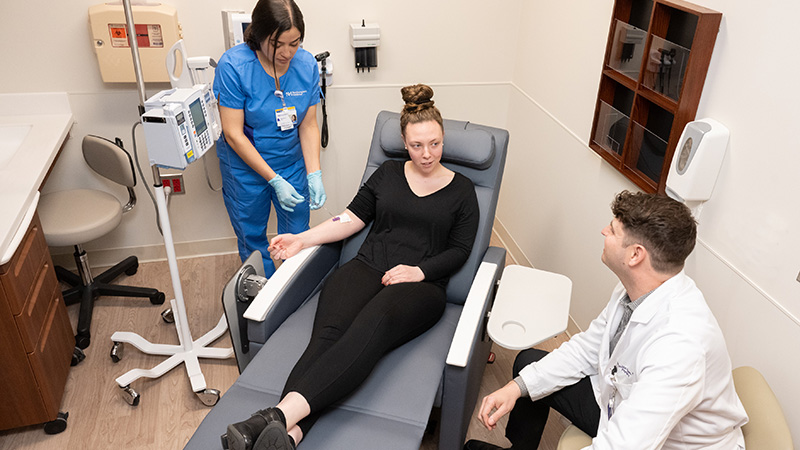Care for the Soul
Published January 2022
Chaplains Help Patients Heal
A baby headed for adoption. A young life tragically diverted by the sudden diagnosis of a terminal illness. A struggle to make end-of-life decisions for a parent. At the bookends of life and every stage in between, scenes of grief, anxiety and confusion play out in hospital rooms across the world. In all of these situations at Northwestern Medicine hospitals, Northwestern Medicine chaplains have offered their presence, support and, perhaps most important, a listening ear.
Northwestern Medicine offers spiritual care across its 10 hospitals with a staff of highly trained chaplains and a team of volunteers who support them.
“Patients and families often feel lost in the wilderness of unfamiliar, unpredictable and frightening terrain of uncertainty, grief and loss,” explains Rod Accardi, DMin, BCC, director, Spiritual Care and Education, Northwestern Medicine Central DuPage Hospital. “Professional chaplains can enter into that journey with them.”
Northwestern Medicine chaplains are considered part of the care team, one aspect of providing patient-centered care. “Studies have demonstrated that spirituality is important to patients, and they want us to incorporate it into their care,” says Mark Bradley, BCC, manager of Spiritual Care at Northwestern Memorial Hospital.
Science and Spirituality
Like the clinical care delivered at the hospitals, spiritual care also has a solid scientific foundation.
“Studies have proven that having spiritual support and spiritual practices like prayer and meditation increases resiliency, reduces blood pressure and anxiety, helps people process emotions and gives people a greater sense of well-being,” explains Emily Rosencrans, MDiv, MFT, manager, Spiritual Care and Education, Northwestern Medicine Lake Forest Hospital. “Faith and hope have healing power.”
Faith and hope have healing power.— Emily Rosencrans, MDiv, MFT
Rev. Dr. Bradley’s team, which includes highly trained chaplains as well as students and residents learning through a Clinical Pastoral Education program, takes a clinical approach to spiritual care: They conduct a spiritual assessment by listening to patients, determine their needs and then implement strategies to meet those needs. Like other care providers, Rev. Dr. Bradley explains, “We line up interventions to move to outcomes.”
At Northwestern Medicine Marianjoy Rehabilitation Hospital spiritual care plays a particularly important role in pain relief. Linnea Winquist, MDiv, BCC, director of Spiritual Care and Education at Marianjoy, says the hospital is supporting a national effort to reduce the use of opioids for pain relief.
Marianjoy Rehabilitation Hospital offers a pain group that teaches seven strategies for alleviating pain without medication. The strategies are easy to use, evidence-based and have been shown to be effective with previous patients at Marianjoy. The hospital also conducts a meditation group and an aromatherapy group that offer education and practice in these techniques. Other Spiritual Care services include hand massages, therapeutic touch, healing music and a finger labyrinth that can bring relaxation and improve patients’ sense of well-being. The campus also features several sacred spaces, including an outdoor labyrinth, gardens and a peace path, plus a chapel and designated meditation room within the hospital.
Open to All Faiths — and No Faith
Northwestern Medicine chaplains are trained to minister to all patients, regardless of their specific beliefs. Their care is effective because, first and foremost, they are “professional listeners,” says Rev. Dr. Bradley. “We don’t know everything, but we know how to listen. We give people a chance to express their thoughts, values and emotions.”
“Chaplains listen for what is most meaningful to the patient, which is not always their physical condition. They may come to the hospital for medical treatment, but we are treating the whole person,” says Dena Battaglia, OSSM, manager of Guest Services, Northwestern Medicine McHenry Hospital. Chaplain Battaglia recalls how a patient being treated for hypertension opened up about a recent job loss and its effect on her emotionally. After the conversation, Chaplain Battaglia says, “She informed me that this was the first time she felt peace in a long time. She was cared for by the entire care team, body, mind and spirit.”
“It’s a myth that chaplains are only for patients who consider themselves religious,” explains Chaplain Winquist. “We have special training to support all patients. We have meaningful conversations that help patients explore their own beliefs.”
Rev. Dr. Bradley says some patients struggle with relationship issues, especially at the end of life when they are reflecting on strained relationships. And some patients struggle with the idea that their illness is a result of punishment from God. “We try to alleviate that, because we know from recent research that these beliefs are correlated with health outcomes,” he says.
The Many Aspects of Spiritual Care
Besides listening, Northwestern Medicine chaplains offer a huge variety of support services for patients, families, caregivers and medical providers. “Spiritual Care services are important for patients and families to have comfort, solace, and someone who is helping them process, discern, and make wise and lasting decisions that reflect patient and family beliefs and values,” explains Rev. Rosencrans.
Chaplains can be invaluable when families are struggling with medical decision-making and seeking ethics consultation. This type of support is particularly important when religious beliefs may impact medical decisions, says M. Jeanne Wirpsa, MA, BCC, research chaplain and clinical ethicist, Northwestern Memorial Hospital.
Chaplain Battaglia recalls the story of a chaplain who held an “entrusting ceremony” between a birth mother and the baby’s adoptive parents, through which each parent was able to share their hope and love for the child. “The adoption social worker was amazed how this ritual helped bring this family together,” she says.
Of course, Spiritual Care does also encompass more traditional religious support for those who seek it. For example, Rev. Rosencrans provided a profound service recently to a couple after a patient learned he may have only hours to live. The couple had hoped to marry, and asked Rev. Rosencrans to officiate the ceremony. Within hours, the couple secured the proper paperwork, everything fell into place and they said “I do” before leaving for hospice care.
Additional religious support includes:
- Praying with people
- Providing religious materials
- Offering communion, confession and baptism
- Conducting onsite religious services
Northwestern Medicine Spiritual Care also serves an important role in supporting staff, especially during times of crisis or grief. Chaplains are available to talk with staff members and may offer additional services, like a “care cart” with treats, at the request of a manager. This type of support enhances resilience and well-being for the care team, and ultimately translates to better patient care.
A World of Difference
While spiritual care may not be the first thing that comes to mind when you think about a hospital stay, it is often one thing that makes the most lasting impact on those who are served. “Most patient comments are expressions of profound gratitude for the calming presence and deep listening during times of significant transition and loss and death,” says Rev. Dr. Accardi.
Rev. Rosencrans reports that after a colleague sat in a meeting with a woman who decided on hospice care for her mother, the woman noted, “I never realized how soothing and significant it is for a chaplain to be present at those meetings. At the end, when you prayed, despite all the emotions I was feeling, I felt grounded and centered and knew my mother was in God’s hands. It made a world of difference.”





